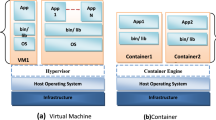Abstract
The rapid advances of network technologies shed light on many aspects of the practicability of large scale ubiquitous computing. Grid technology has been recognized as an efficient solution to coordinate large-scale shared resources and execute complex applications in heterogeneous network environments. The problem of resource management and task allocation has always been one of the main challenges. In this paper, we present an efficient task allocation strategy for distributing tasks onto computing nodes in the underlying heterogeneous networks. The contribution of the proposed technique is to minimize average turnaround time by dispatching tasks to processors with smallest communication ratio. System throughput could be also enhanced by dispersing processor idle time. The proposed technique can be applied to heterogeneous cluster systems as well as computational grid environments, in which the communication costs vary in different clusters. Experimental results show that the proposed scheme outperforms other previous algorithms in terms of throughput and turnaround time.
Similar content being viewed by others
References
Banino C, Beaumont O, Carter L, Ferrante FJ, Legrand A, Robert Y (2004) Scheduling strategies for master-slave tasking on heterogeneous processor platforms. IEEE Trans Parallel Distrib Syst 15(4):319–330
Bataineh S, Hsiung TY, Robertazzi TG (1994) Closed form solutions for bus and tree networks of processors load sharing a divisible job. IEEE Trans Comput 43(10):1184–1196
Beaumont O, Boudet V, Rastello F, Robert Y (2000) Matrix–matrix multiplication on heterogeneous platforms. In: Proc int’l conf parallel processing (ICPP’ 2000), pp 289–298
Beaumont O, Boudet V, Petitet A, Rastello F, Robert Y (2001) A proposal for a heterogeneous cluster ScaLAPACK (Dense linear solvers). IEEE Trans Comput 50(10):1052–1070
Beaumont O, Legrand A, Robert Y (2003) The master-slave paradigm with heterogeneous processors. IEEE Trans Parallel Distrib Syst 14(9):897–908
Beaumont O, Legrand A, Robert Y (2005) Pipelining broadcasts on heterogeneous platforms. IEEE Trans Parallel Distrib Syst 16(4):300–313
Berman F, Wolski R, Casanova H, Cirne W, Dail H, Faerman M, Figueira S, Hayes J, Obertelli G, Schopf J, Shao G, Smallen S, Spring N, Su A, Zagorodnov D (2003) Adaptive computing on the grid using AppLeS. IEEE Trans Parallel Distrib Syst 14(4):369–379
Braun TD, Siegel HJ, Beck N, Boloni L, Maheswaran M, Reuther AI, Robertson JP, Theys MD, Yao B (1998) A taxonomy for describing matching and scheduling heuristics for mixed-machine heterogeneous computing systems. In: Proceedings of the IEEE workshop on advances in parallel and distributed systems, pp 330–335
Cao J, Spooner DP, Jarvis SA, Nudd GR (2005) Grid load balancing using intelligent agents. Int J Future Gener Comput Syst (FGCS) 21:135–149
Casanova H, Legrand A, Zagorodnov D, Berman F (2000) Heuristics for scheduling parameter sweep applications in Grid environments. In: Proceedings of the 9th heterogeneous computing workshop (HCW’2000), pp 349–363
Casanova H, Berman F, Chien A, Cooper K, Dail H, Dasgupta A, Deng W, Dongarra J, Johnsson L, Kennedy K, Koelbel C, Liu B, Liu X, Mandal A, Marin G, Mazina M, Mellor-Crummey J, Mendes C, Olugbile A, Patel M, Reed D, Shi Z, Sievert O, Xia H, YarKhan A (2005) New Grid scheduling and rescheduling methods in the GrADS project. Int J Parallel Program 33(2–3):209–229
Charcranoon S, Robertazzi TG, Luryi S (2000) Optimizing computing costs using divisible load analysis. IEEE Trans Comput 49(9):987–991
Chronopoulos AT, Jagannathan S (2002) A distributed discrete-time neural network architecture for pattern allocation and control. In: Proc IPDPS workshop bioinspired solutions to parallel processing problems, p 3
Cooperman G, Casanova H, Hayes J, Witzel T (2003) Using TOP-C and AMPIC to port large parallel applications to the ComputationalGrid. Int J Future Gener Comput Syst (FGCS) 19(4):587–596
Dhodhi MK, Yatama IAA, Yatama A, Ahmad I (2002) An integrated technique for task matching and scheduling onto distributed heterogeneous computing systems. J Parallel Distrib Comput 62(9):1338–1361
Dogan A, Ozguner F (2002) Matching and scheduling algorithms for failure probability of applications in heterogeneous computing. IEEE Trans Parallel Distrib Syst 13(3):308–323
Hagras T, Janecek J (2005) A high performance, low complexity algorithm for compile-time task scheduling in heterogeneous systems. Parallel Comput 31(7):653–670
Han C-C, Shin KG, Wu J (2003) A fault-tolerant scheduling algorithm for real-time periodic tasks with possible software faults. IEEE Trans Comput 52(3):362–372
Li M, van Santen P, Walker DW, Rana OF, Baker MA (2004) SGrid: a service-oriented model for the semantic Grid. Int J Future Gener Comput Syst (FGCS) 20:7–18
Maheswaran M, Ali S, Siegel HJ, Hensgen D, Freund R (1999) Dynamic mapping of a class of independent tasks onto heterogeneous computing systems. In: Proceeding of the 8th IEEE heterogeneous computing workshop (HCW ’99), pp 30–44
Min R, Maheswaran M (2002) Scheduling co-reservations with priorities in grid computing systems. In: Proceedings of the 2nd IEEE/ACM international symposium on cluster computing and the grid (CCGRID’02), pp 250–251
Plank J, Casanova H, Beck M, Dongarra J (1999) Deploying fault tolerance and task migration with NetSolve. Int J Future Gener Comput Syst (FGCS) 15:745–755
Schopf JM (2002) A general architecture for scheduling on the grid. In: TR-ANL/MCS, special issue of JPDC on grid computing, pp 1000–1002
Srinivasan S, Jha NK (1999) Safety and reliability driven task scheduling allocation in distributed systems. IEEE Trans Parallel Distrib Syst 10(3):238–251
Thanalapati T, Dandamudi S (2001) An efficient adaptive scheduling scheme for distributed memory multicomputers. IEEE Trans Parallel Distrib Syst 12(7):758–767
Author information
Authors and Affiliations
Corresponding author
Rights and permissions
About this article
Cite this article
Hsu, CH., Chen, TL. & Park, JH. On improving resource utilization and system throughput of master slave job scheduling in heterogeneous systems. J Supercomput 45, 129–150 (2008). https://doi.org/10.1007/s11227-008-0211-3
Received:
Accepted:
Published:
Issue Date:
DOI: https://doi.org/10.1007/s11227-008-0211-3




